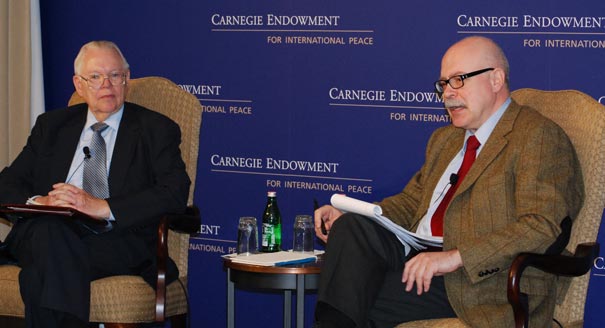Registration
You will receive an email confirming your registration.
With Russia’s presidential elections scheduled for March 4, 2012, Vladimir Putin is facing the most serious challenge since the establishment of his “power vertical.” Carnegie’s Dmitri Trenin and Ambassador James F. Collins discussed how Russia’s presidential elections will influence its politics.
Changing Dynamics of Russia’s Politics
- Presidential Election: The upcoming presidential election will be “the most interesting, if not the most important election Russia will have since 1996,” said Trenin.
- Russia’s Middle Class: Russia’s growing middle class consists of people who focused primarily, if not exclusively, on themselves, Trenin explained. “They learned in the past twenty years that the only path to survival and success is an individual path,” he said. However, these same people have now realized that further progress cannot be individually realized and that the government is not treating them as citizens. They are now stepping into the public square and protesting, said Trenin.
Changing the Way Russia is Governed
If the system in Russia could be characterized as authoritarianism with consent of the governed before December 2011, this consent is being withdrawn, asserted Trenin. Russia’s politics are changing–previously dormant political parties are being revitalized and the Duma is growing stronger.
- Concessions: After the December Duma elections and the resulting popular protests, the Russian government made several concessions, Trenin said. Since they could not ignore the popular awakening, they have instead:
- Proposed changes to some laws, including reinstating the direct elections of governors, making it easier for political parties to get registered, and perhaps allow wider election monitoring in Russia.
- Opened the television media, at least partially. Individuals who were not previously allowed to express themselves on television, like Boris Nemtsov, Vladimir Ryzhkov, have been allowed to appear in the media.
- Protesters: The protesters are breaking new ground in Russian politics, said Trenin. The older generation “looks really old” in comparison, he explained. There is a clear realization that the new generation of bloggers and cultural figures gives Russian politics a different flavor, new energy, and translates into the future pattern of Russian politics.
- Government Backlash: In spite of some concessions, the Kremlin has refused to yield to the protesters’ demands to annul the Duma election and fire the chief of Central Electoral Commission, who is widely held responsible for rigging the vote, added Trenin.
Presidential Election and Its Implications
- Election Preparation: Putin’s supporters believe that Putin must win in the first ballot, Trenin said. They fear that if Putin were forced to compete in a second ballot, it would be a sign of weakness that would usher in chaos and destabilization. All their resources are being brought to bear in order to assure Putin’s victory in the first round, with a massive effort to get as many people to vote for Putin as possible, added Trenin.
- Expected Election Results: “I would say that Putin still can rely on the support of 50 percent of the people,” Trenin said. Putin portrays himself as the champion of the interests of the lower classes by raising pensions, refusing to raise the pension age, being tough in foreign policy, and appealing to his traditional base.
- After the Election: “I would expect many people in Russia, in particular in big cities, to disagree with the results,” added Trenin. He explained that they will claim that either the vote has been rigged or that the whole election campaign was not free. Putin be seen as without legitimacy by many people in Russia and abroad, leading a domestic policy issue to become a foreign policy issue.
- Further Demonstrations: Trenin argued that in the aftermath of the elections, both Putin’s supporters and the opposition will need to find a way to manage the protests and popular rejection of Putin’s legitimacy in a way that will not destabilize the country. The demonstrations will need to be permitted to be held in a peaceful way, he said.
- Elite Cohesion: Russia’s elite has stayed more or less in one piece but its cohesion is not to be taken for granted, added Trenin. It is possible that people who have supported Putin for a long time, may now think that it is time to have a big overhaul.
- Implications for Policy: Putin has published a half-dozen articles detailing his platform before the election, but it remains to be seen whether he has the people to implement his policies, said Trenin.
- Corruption: “You cannot seriously maintain that corruption stops at the Kremlin wall,” said Trenin. “A lot of people become rich while in position of power in Russia.” He argued that Putin will need to resolve the issue of corruption if he wants to strengthen his legitimacy.
“This change will not stop on election day,” concluded Trenin. “The process is there and it will continue in the direction of change. An ideal future, in my view, would be for Mr. Putin’s power to be limited and for other institutions to be stepping in.”
